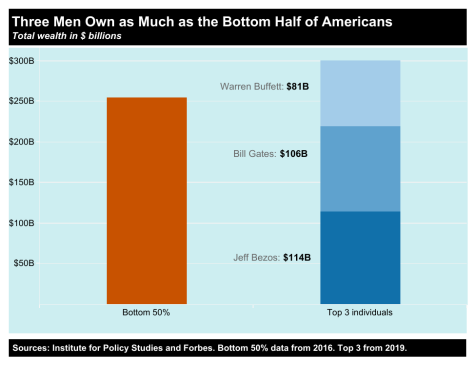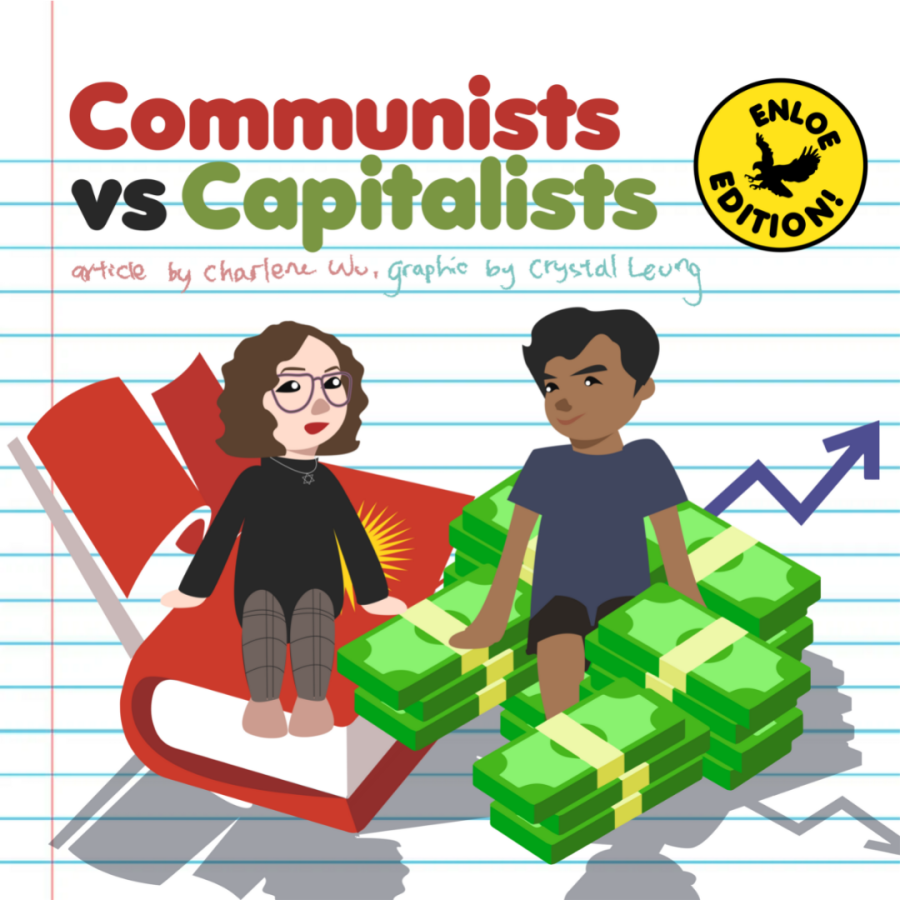The Capitalists vs Communists of Enloe
The modern wealth disparity of America is not just, and cannot be sustained with its current policies. With this, differing opinions from Enloe students arise for where America should lead to: regulation within capitalism or a communist revolution. Here are seniors Neel Singh, Miri Feigin, Samy Vipin, and Enloe alumni Aaryan Sharma (‘20) and Jack Collins (‘18) with their thoughts.
Econ 101
Classical economists acknowledge three types of modern economies: command, market and mixed. Simplified, command (communist) has a central power completely deciding what/ how society produces and provides goods and services. Market (capitalist) prioritizes private property, what’s produced is based on what the public wants. How it’s produced is decided by suppliers, and how people get them is determined by how much they’re willing to pay. Socialism differs with all citizens equally sharing resources distributed by elected governments. However, no nation actually caters to one extreme.
Addressing the Wealth Gap
In 2016, three white men (Buffet, Gates, Bezos) collectively owned more wealth than the bottom 50% of Americans’ total wealth in 2019 ($301B; $255B, respectively.) Yet billionaires like Bezos didn’t pay any income tax for at least two years between 2006 and 2018; most of their wealth is held in stocks, allowing them to bypass income taxes.

To address wealth disparity and monopolies, VP of Investment Club Neel Singh suggests stricter regulation: “High taxation while keeping the capitalist framework is the best way to distribute wealth that is fair and equal, providing for a minimum and acceptable standard of living for individuals.” NCSU economics major Aaryan Sharma (‘20), thinks similarly. “You’re thinking too much of ‘abolish corporations,’ when in reality it should be ‘how to support local [businesses].’ Villainizing corporations is a terrible idea; they honestly help out a lot more than local businesses due to corporate social responsibility.”
Others believe taxation will never work. Jack Collins (‘18) works for the General Assembly of Virginia and is pursuing a Master’s in public policy at Liberty University. He believes only policies promoting economic growth would lift individuals out of poverty. In defense of global corporations, he states, “Due to their participation in the free-market system, countless nations have seen an incredible GDP and per capita income growth, increased demand for goods and services traditionally unavailable, and improved investments.”
High taxation while keeping the capitalist framework is the best way to distribute wealth that is fair and equal.
— Neel Singh
However, Samy Vipin argues the free market is inefficient and unfair, “We make [1.5] times the amount of food we need to feed the entire population, so for that to be true, but people still die from starvation? That’s obviously not the most efficient way to determine where resources should go.” She states under a system with profit motives, “no matter how much you tax a corporation, it’s not going to get to a point where they’re philanthropic overnight… It’s not possible to deal with the wealth gap that way.”
Meanwhile Miri Feigin believes capitalism sustains exploitation. “It’s impossible to separate capitalism from imperialism. Looking back to the age of exploration, the reason why so many African, Asian, Latin American countries were [exploited] was because of the need and want for wealth.” Feigin calls for taking all wealth from wealthy individuals and corporations to equally redistribute among society.
Communist Connotations
Feigin and Vipin identify as communists. This has much backlash. Singh replies, “While [it] sounds good on paper, the mechanisms by which societal ownership holds means of production has, in history, led to worse economic outcomes and destruction of individual rights.”
My parents grew up in the late stages of the Soviet Union. I’ve grown up hearing many anti-communist sentiments.
— Miri Feigin
Feigin explains, “My parents grew up in the late stages of the Soviet Union. I’ve grown up hearing many anti-communist sentiments. [Often] it’s misconstrued, especially when comparing the beginning and end of the USSR, and how western interventionism played a role in undoing a lot of the progress in [socialist] societies. It’s more important to look at the studies that [theorists] like Marx, Lenin, Mao were teaching. Of course I have criticisms of the way they govern, but their actual theories were very important and well written.”
Vipin states it’s hypocritical to condemn communism for violence when capitalist society also isn’t peaceful. “The liberal state relies on violence in its own ways, like police brutality, imperialism and foreign wars for oil. Everything, this country itself, is built on genocide and slavery. I urge people to reconsider the idea that our current state is peaceful, because it’s not, [violence’s] just redirected to the people we don’t care about.”
Communist Models
Marinaleda, Spain

One remote community in Spain, Marinaleda, is dubbed a “communist utopia.” Their economy revolves around local agriculture, but what makes it special is it’s completely employee-owned. Management decisions are made among workers’ general assembly. Across the board, everyone’s paid double the Spanish minimum wage. Additional profits aren’t distributed; instead, surplus is reinvested into job-building. Small businesses are around, however large franchises aren’t permitted.
“[Marinaleda] is very similar to what I visualize on a global scale for communism, …in the masses owning the means of production,” Feigin states. “But it’s impossible to get there with current [US] imperialist structures. It is important to first abolish that, before we get to a more anti-capitalist stage.”
Collins notes Marinaleda still collects income from the state and isn’t completely communist. “One remote village in Spain with a population of less than 3,000 that has associated itself with communism on the surface is no justification for instituting a tried and failed economic system.”
Kerala, India
Vipin points to Kerala, India, where she’s from, as another step in the right direction. “Kerala’s literacy, education and female employment rates went up, and it’s because of the socialist government being able to provide the people what they needed to flourish.” She believes in a society where everyone works together, “In the US… with the capitalist mentality, ‘Every man for himself,’ there’s no sense of community. It creates alienation and it’s unproductive towards being a healthy human being.”

A new consideration is the incorporation of AI. “Before socialist states didn’t have resources to [successfully] produce things nationally. But with the kind of technology we’ll develop, central planning has become a more viable solution. Based on the number of people and needs [calculated], it’s easier to organize redistribution,” says Vipin.
Reform or Revolution?

Singh still believes in the existence of large corporations, just with heavier regulation through sanctions or high taxes. He proposes reallocating tax revenue towards social services such as public healthcare. “So yes, what I’m describing sounds a lot like Germany and Denmark, often defined as socialist. That’s not true, those countries are capitalist.” He believes America should use such policy models.
Feigin agrees with increased public funding, but raises concerns. “All of those government funded services, I support that. But you also must think about who the government is. [European and liberal American politicians] are really just social Democrats that actively support the imperialist government structures.”
Communists get accused of being idealistic, but if you don’t believe in anything, then why are you even trying?
— Samy Vipin
“Communists get accused of being idealistic, but if you don’t believe in anything, then why are you even trying?” voices Vipin, “If this is what you think everything is always going to be, then what’s the point of your political activism? What do you even believe in?”
The expanding wealth gap is unsustainable, crippling the working majority while a select few become exponentially wealthier. America needs at least progressive change, or maybe the system will just be upturned completely.
Your donation will support the student journalists of Enloe Magnet High School, allowing us to cover our annual website costs. We are extremely grateful for any contribution, big or small!

Charlene's pass-times include: evaluating her Google Calendar color scheme, baking Tres Leches, and parking badly. Ask her, "How was your day?" and she'll...

















